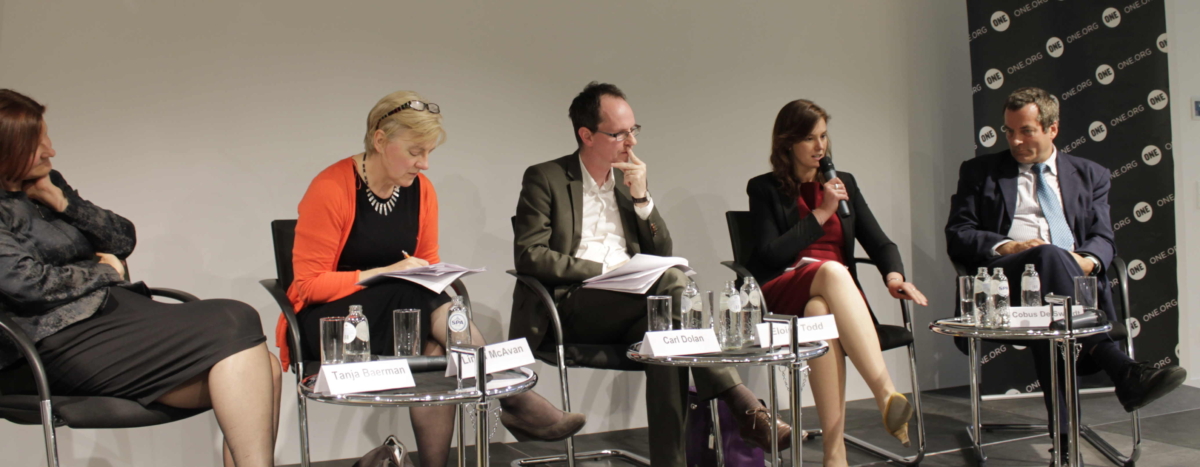On 25 May 2016 Transparency International in partnership with ONE and the State Government of North Rhine-Westphalia hosted a discussion on the UN’s Sustainable Development Goals (SDGs) and corruption.
Goal 16 of the SDGs focuses on peace, justice and building strong institutions. Fighting corruption is at the heart of Goal 16. From illegal logging to poverty, hunger and injustice corruption is at the core of the major problems we face. Before the SDGs were finalised, civil society organisations, including Transparency International, agreed with UN Secretary General Ban Ki Moon that the SDGs would only work if they encapsulated a strong human rights framework – one which includes accountability, sustainability, inter-connectivity, participation and universality.
One of the major innovations of the SDGs is their universality; international cooperation to fight corruption should not be restricted to developing countries – all countries are, after all, in a constant process of development. Universality is vital for the success of SDG 16 and as such corruption should no longer be framed by the north-south divide. On the contrary, the EU needs to use the SDGs to clean up its own backyard. Cobus de Swardt, managing director of Transparency International, believes that the moral responsibility to act lies with the developed world, since the illicit wealth flows from poor countries to rich ones.
The EU’s role in anti-corruption efforts has been undervalued. It encourages the rule of law in its pre-accession processes and in its bilateral cooperation. Despite this, Linda McAvan, MEP, noted the lack of public confidence in the EU institutions.
According to director of Transparency International EU Carl Dolan the EU’s role in anti-corruption needs to ‘regain force’. Mr de Swardt echoed this point, suggesting the EU’s positive role should be pushed within member states. Tackling tax havens is seen as a priority of the EU in the coming few years, including examining the role of intermediaries who facilitate questionable behaviour, such as bankers, accountants and lawyers.
“Tackling corruption means tackling aggressive tax avoidance”
– Linda McAvan, MEP
Two further issues currently providing an opportunity for EU-wide reform are the anti-money laundering directive, where the political space is now open for full transparency on beneficial ownership for both companies and trusts, and public country-by-country reporting.
“Transparency is the best vaccine against corruption”
– Eloise Todd, Global Policy Director, One
Mr Dolan continued by saying that ‘there has been no better moment in the past eight years to raise anti-corruption efforts at the global level’, due in part to the Panama Papers and the London Summit. Eloise Todd, ONE’s Global Policy Director, agreed that the Panama Papers have given a unique political opportunity due to the universality of the issue: if policy makers do not act now, what will it take for them to act? However, Mr de Swardt warned that the Panama Papers were just the tip of the iceberg and that, although there was some value in the outcomes of the London Summit, most were just window dressing. It was agreed that the Summit was the first step, a starting point for real work.
Ms McAvan sees implementation of the SDGs as the next challenge, since indicators will be finalised in July 2016. For example, how would we measure the number of bribes being paid?
Mr Swardt warned that the shrinking of civil society space and the attack on civil liberties, even in some European countries, is endangering the participatory element of the SDGs. It is civil society which needs to raise the bar and gain more ambition. The European Parliament’s Committee on Development (DEVE) is currently preparing a report on shrinking civil society space.
“We are the first generation that has the capacity and tools to end endemic corruption”
– Cobus de Swardt
In the Q&A session with the audience questions were asked about how to involve the private sector in achieving the 2030 Agenda, which has so far had a very limited role. Corruption risks associated with the increased use of budget support to aid development were also mentioned. Ms Todd pointed out that these risks can be mitigated by utilising data to allow for greater accountability.
Adoption of the SDGs is a major breakthrough, however is also an elephant-sized task. We need to start with small steps in our own vicinity.
At Transparency International we are working in coalition with a range of civil society organisations to push for the implementation of the 2030 Agenda at the EU level and beyond.




